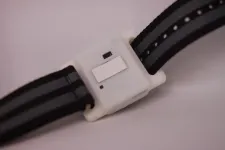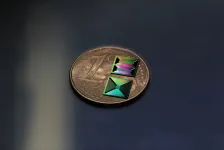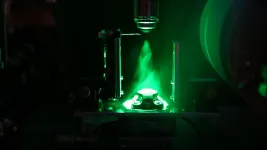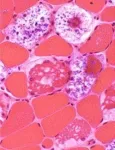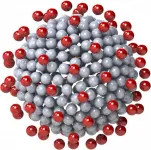The researchers will present their results today at the spring meeting of the American Chemical Society (ACS). ACS Spring 2021 is being held online April 5-30. Live sessions will be hosted April 5-16, and on-demand and networking content will continue through April 30. The meeting features nearly 9,000 presentations on a wide range of science topics.
A video on the research is available at http://www.acs.org/acsspring2021cytokinesensor.
"Especially now in the context of COVID-19, if you could monitor pro-inflammatory cytokines and see them trending upwards, you could treat patients early, even before they develop symptoms," says Shalini Prasad, Ph.D., the project's principal investigator, who is presenting the work at the meeting.
Early detection is important because once a cytokine storm has been unleashed, the excessive inflammation can damage organs, causing severe illness and death. In contrast, if doctors could administer steroidal or other therapies as soon as cytokine levels begin to rise, hospitalizations and deaths could be reduced.
Although blood tests can measure cytokines, they are difficult to perform at home, and they can't continuously monitor the proteins' levels. Cytokines are excreted in sweat at lower levels than in blood. To collect enough sweat for testing, scientists have asked patients to exercise, or they have applied a small electrical current to patients' skin. However, these procedures can themselves alter cytokine levels, Prasad notes. "When it comes to cytokines, we found that you have to measure them in passive sweat. But the big challenge is that we don't sweat much, especially in air-conditioned environments," she says. Prasad, who is at the University of Texas at Dallas, estimates that most people produce only about 5 microliters, or one-tenth of a drop, of passive sweat in a 0.5-inch square of skin in 10 minutes.
So the researchers wanted to develop an extremely sensitive method to measure cytokine levels in tiny amounts of passive sweat. They drew on their previous work on a wearable sweat sensor to monitor markers of inflammatory bowel disease (IBD). The wristwatch-like device, which is being commercialized by EnLiSense LLC (a company co-founded by Prasad), measures the levels of two proteins that spike during IBD flare-ups. When the device is worn on the arm, passive sweat diffuses onto a disposable sensor strip that is attached to an electronic reader. The sensor strip, which contains two electrodes, is coated with antibodies that bind to the two proteins. Binding of the proteins to their antibodies changes the electrical current flowing through the e-reader. The reader then wirelessly transfers these data to a smartphone app that converts electrical measurements to protein concentrations. After a few minutes, the old sweat diffuses out, and newly excreted sweat enters the strip for analysis.
For their new cytokine sensor (called the SWEATSENSER Dx), the researchers made sensor strips with antibodies against seven pro-inflammatory proteins: interleukin-6 (IL-6), IL-8, tumor necrosis factor-α (TNF-α), TNF-related apoptosis-inducing ligand, IL-10, interferon-γ-induced protein-10 and C-reactive protein. They inserted the strips into their device and, in a small observational study, they tested them on six healthy people and five people with influenza. Two of the sick people showed elevated cytokine levels, and in all participants, cytokines in passive sweat correlated with levels of the same proteins in serum.
The SWEATSENSER Dx was even sensitive enough to measure cytokines in patients taking anti-inflammatory drugs, who excrete cytokines in the low-picogram-per-milliliter concentration range. The device tracked cytokine levels for up to 168 hours before the sensor strip needed to be replaced.
EnLiSense, in partnership with the researchers, is now planning clinical trials of the cytokine sensor in people with respiratory infections. "Access to COVID-19 patients has been a challenge because healthcare workers are overwhelmed and don't have time to test investigational devices," Prasad says. "But we're going to continue to test it for all respiratory infections because the disease trigger itself doesn't matter -- it's what's happening with the cytokines that we're interested in monitoring."
INFORMATION:
The American Chemical Society (ACS) is a nonprofit organization chartered by the U.S. Congress. ACS' mission is to advance the broader chemistry enterprise and its practitioners for the benefit of Earth and all its people. The Society is a global leader in promoting excellence in science education and providing access to chemistry-related information and research through its multiple research solutions, peer-reviewed journals, scientific conferences, eBooks and weekly news periodical Chemical & Engineering News. ACS journals are among the most cited, most trusted and most read within the scientific literature; however, ACS itself does not conduct chemical research. As a specialist in scientific information solutions (including SciFinder® and STN®), its CAS division powers global research, discovery and innovation. ACS' main offices are in Washington, D.C., and Columbus, Ohio.
A press conference on this topic will be held Friday, April 16, at 2 p.m. Eastern time online at http://www.acs.org/acsspring2021conferences.
The researchers acknowledge support and funding from the Biomedical Advanced Research and Development Authority DRIVe program and EnLiSense LLC.
The American Chemical Society (ACS) is a nonprofit organization chartered by the U.S. Congress. ACS' mission is to advance the broader chemistry enterprise and its practitioners for the benefit of Earth and its people. The Society is a global leader in providing access to chemistry-related information and research through its multiple research solutions, peer-reviewed journals, scientific conferences, eBooks and weekly news periodical Chemical & Engineering News. ACS journals are among the most cited, most trusted and most read within the scientific literature; however, ACS itself does not conduct chemical research. As a specialist in scientific information solutions (including SciFinder® and STN®), its CAS division powers global research, discovery and innovation. ACS' main offices are in Washington, D.C., and Columbus, Ohio.
To automatically receive news releases from the American Chemical Society, contact newsroom@acs.org.
Note to journalists: Please report that this research was presented at a meeting of the American Chemical Society.
Follow us: Twitter | Facebook
Title
SWEATSENSER DX an enabling technology for on demand profiling of cytokines on passively expressed eccrine sweat
Abstract
The goal of the SWEATSENSER Dx platform is to demonstrate clinically relevant wearable electrochemical biosensor system that continuously tracks WELLNESS-ILLNESS-WELLNESS states in the wearer. The premise of this technology is in establishing that physiological changes in a person precedes the symptoms for a variety of ILLNESSES, and that these changes in conjunction with vitals are traceable to changing levels of multiple pro- and anti-inflammatory cytokines released and presented in passively expressed Sweat in response to inflammation or infection events. A "cytokine storm" in a flu infection, is often associated with a surge of activated immune cells into the lungs. The resulting lung inflammation and fluid buildup can lead to respiratory distress and can be contaminated by a secondary bacterial pneumonia -- often enhancing the mortality in patients. The cytokine storm is thought to occur in at least several types of infections and autoimmune conditions, but it appears to be particularly relevant in outbreaks of new flu variants and more recently in Covid-19.
SWEATSENSER Dx is a non-invasive, real-time sensing system that has demonstrated potential for rapidly assessing and monitoring temporal dynamics of cytokines from humans and has the capability of monitoring the cytokine storm, which is a current technological gap. The ability to monitor a panel of cytokines in a non-invasive, temporally dynamic manner from passively expressed eccrine sweat that our SWEATSENSER Dx wearable platform technology provides is therefore has the potential as an enabling technology for proactively assessing health threats in a non-invasive manner while providing actionable data in an on-demand manner. Passively expressed Eccrine Sweat contains a plethora of health information including inflammatory cytokines. Our Wearable Point-of-Need SWEATSENSER Dx platform based on electrochemical biosensing system offering real-time, continuous reporting from passively expressed eccrine sweat (1-5 microliters) with no external stimulation, can rapidly detect (≤ 3 minutes), and continuously track multiple Cytokine biomarker levels from as low as 1 pg/mL to 10,000 pg/mL in a multiplexed manner in a person towards establishing the occurrence and progress of infection post-exposure and prior to the manifestation of symptoms to predicting an onset of a cytokine storm.
